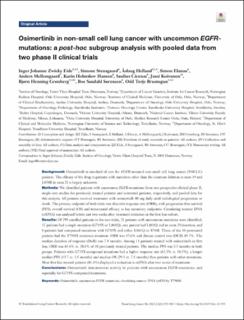| dc.contributor.author | Eide, Inger Johanne Zwicky | |
| dc.contributor.author | Stensgaard, Simone | |
| dc.contributor.author | Helland, Åslaug | |
| dc.contributor.author | Ekman, Simon | |
| dc.contributor.author | Mellemgaard, Anders | |
| dc.contributor.author | Hansen, Karin Holmskov | |
| dc.contributor.author | Cicenas, Saulius | |
| dc.contributor.author | Koivunen, Jussi | |
| dc.contributor.author | Grønberg, Bjørn Henning | |
| dc.contributor.author | Sørensen, Boe Sandahl | |
| dc.contributor.author | Brustugun, Odd Terje | |
| dc.date.accessioned | 2023-01-18T13:15:04Z | |
| dc.date.available | 2023-01-18T13:15:04Z | |
| dc.date.created | 2022-09-27T13:42:52Z | |
| dc.date.issued | 2022 | |
| dc.identifier.citation | Translational Lung Cancer Research (TLCR). 2022, 11 (6), 953-963. | en_US |
| dc.identifier.issn | 2218-6751 | |
| dc.identifier.uri | https://hdl.handle.net/11250/3044342 | |
| dc.description.abstract | Background: Osimertinib is standard of care for EGFR-mutated non-small cell lung cancer (NSCLC) patients. The efficacy of the drug in patients with mutations other than the common deletion in exon 19 and L858R in exon 21 is largely unknown.
Methods: We identified patients with uncommon EGFR-mutations from two prospective clinical phase II, single-arm studies for previously treated patients and untreated patients, respectively, and pooled data for this analysis. All patients received treatment with osimertinib 80 mg daily until radiological progression or death. The primary endpoint of both trials was objective response rate (ORR), with progression-free survival (PFS), overall survival (OS) and intracranial efficacy as key secondary endpoints. Circulating tumour DNA (ctDNA) was analysed before and two weeks after treatment initiation in the first line cohort.
Results: Of 299 enrolled patients in the two trials, 21 patients with uncommon mutations were identified; 12 patients had a single mutation (G719X or L861Q), one patient had L861Q and an exon 20 insertion, and 8 patients had compound mutations with G719X and either L861Q or S768I. Three of the 10 pretreated patients had the T790M resistance mutation. ORR was 47.6% and disease control rate (DCR) 85.7%. The median duration of response (DoR) was 7.9 months. Among 11 patients treated with osimertinib in first line, ORR was 63.6% vs. 30.0% of 10 previously treated patients. The median PFS was 5.5 months in both groups. Patients with G719X-compound mutations had a higher response rate (62.5% vs. 38.5%), a longer median PFS (13.7 vs. 3.5 months) and median OS (29.3 vs. 7.5 months) than patients with other mutations. Most first line treated patients (81.8%) displayed a reduction in ctDNA after two weeks of treatment.
Conclusions: Osimertinib demonstrates activity in patients with uncommon EGFR-mutations, and especially for G719X-compound mutations. | en_US |
| dc.language.iso | eng | en_US |
| dc.publisher | AME Publishing Company | en_US |
| dc.rights | Attribution-NonCommercial-NoDerivatives 4.0 Internasjonal | * |
| dc.rights.uri | http://creativecommons.org/licenses/by-nc-nd/4.0/deed.no | * |
| dc.title | Osimertinib in non-small cell lung cancer with uncommon EGFR-mutations: a post-hoc subgroup analysis with pooled data from two phase II clinical trials | en_US |
| dc.title.alternative | Osimertinib in non-small cell lung cancer with uncommon EGFR-mutations: a post-hoc subgroup analysis with pooled data from two phase II clinical trials | en_US |
| dc.type | Peer reviewed | en_US |
| dc.type | Journal article | en_US |
| dc.description.version | publishedVersion | en_US |
| dc.source.pagenumber | 953-963 | en_US |
| dc.source.volume | 11 | en_US |
| dc.source.journal | Translational Lung Cancer Research (TLCR) | en_US |
| dc.source.issue | 6 | en_US |
| dc.identifier.doi | 10.21037/tlcr-21-995 | |
| dc.identifier.cristin | 2055920 | |
| dc.relation.project | Helse Sør-Øst RHF: 2021012 | en_US |
| dc.relation.project | Helse Sør-Øst RHF: 2018049 | en_US |
| cristin.ispublished | true | |
| cristin.fulltext | original | |
| cristin.qualitycode | 1 | |

